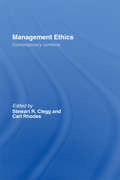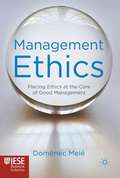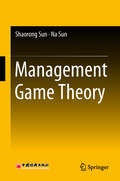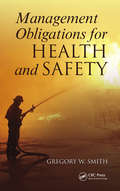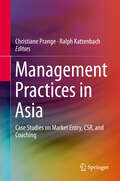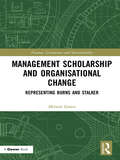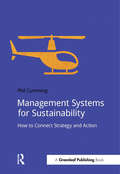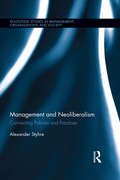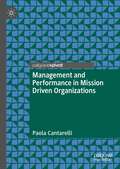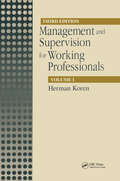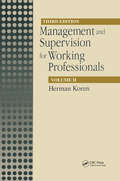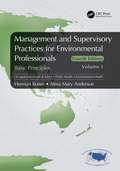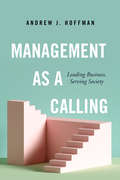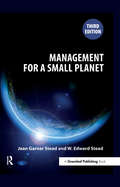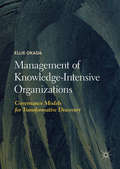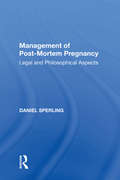- Table View
- List View
Management Ethics: Contemporary Contexts (Routledge Companions In Business, Management And Accounting Ser.)
by Stewart R. Clegg Carl RhodesEthics has become big business but have businesses become ethical? This is a central question for today’s managers. Managing ethics is critical in an era characterized by unprecedented corporate power and a myriad of competing ethical traditions. Giving new insights into the understanding of ethics for today’s organization practice and managerial behaviour, this timely volume, edited by well-respected industry authorities, provides an overview and critique of ethics as they relate to contemporary challenges and issues (such as globalization, sustainability, consumerism, neo-liberalism, corporate collapses, leadership and corporate regulation). This book, an essential read for postgraduate students of business and ethics, is organized around the core question: What are the ethics of organizing in today’s institutional environment and what does this mean for the practice of management and the organization of business? In response to this, the contributors examine ethics as it is deeply embedded in the everyday practice of management. Interdisciplinary contributions from the fields of sociology, philosophy, management, organization studies and public administration provide unique perspectives, while case studies and real-life examples illustrate the challenges and dilemmas faced in practice. Each chapter has a brief overview and editor’s introduction which skilfully summarizes key points and draws connections between the chapters.
Management Ethics: Placing Ethics at the Core of Good Management (Palgrave Macmillan IESE Business Collection)
by Domènec MeléThe recent financial crisis has awakened a renewed sensibility to ethics in business and management, and an increasing interest in a better understanding of how ethics and economics are intertwined. Managers and executives must understand not just the moral value of ethical behaviour, but also how this can strengthen and benefit the organization.
Management Game Theory
by Shaorong Sun Na SunThis book primarily addresses various game theory phenomena in the context of management practice. As such, it helps readers identify the profound game theory principles behind these phenomena. At the same time, the game theory principles in the book can also provide a degree of guidance for solving practical problems.As one of the main areas in management research, there is already an extensive body of literature on game theory. However, it remains mainly theoretical, focusing on abstract arguments and purely numerical examples purely. This book addresses that gap, helping readers apply game theory in their actual management or research work.
Management Obligations for Health and Safety
by Gregory W. SmithIn recent years, the safety management field has placed leadership and commitment at the center of effective workplace health and safety programs. At the same time, personal liability for workplace health and safety has increased, resulting in poor outcomes for individual managers. Discussing the minimum expectations that courts and tribunals have
Management Practices in Asia: Case Studies on Market Entry, CSR, and Coaching
by Christiane Prange Ralph KattenbachAsia is a continent of contradictions and boundaries; it offers exciting business opportunities, but is also characterized by unpredictability and conflict. While flexibility and creativity are in the DNA of many startups in China, major players like Xiaomi and Alibaba have also emerged as global giants, challenging established global competitors. The authors of this book show that these companies are crossing various boundaries – between cultures, mindsets, and perspectives. At the same time, Western companies entering Asian markets face challenges that are very different from those on their home turf. This book addresses the needs of current and future managers doing business in Asia, who need to understand the individual, social and business challenges that can arise from crossing boundaries. The respective case studies provide essential insights on how several Asian companies have made impressive strides towards becoming established players; how the revival of local brands and growing pride in local products has become a major challenge for global competition; how the need to actively practice corporate social responsibility in Asian markets is currently challenging many companies; and how the need for individual and team coaching among the members of management to support a company’s development has grown tremendously, calling for new solutions.
Management Scholarship and Organisational Change: Representing Burns and Stalker (Finance, Governance and Sustainability)
by Miriam GreenChange is a crucial and inescapable process for many organisations. It remains a constant challenge for managers and many change management initiatives fail. Burns and Stalker’s seminal text on managing change, The Management of Innovation, has often been used as a basis for research in mainstream management journals and has been represented as an important theory in popular and long-established management textbooks. The issues raised in that book are still being grappled with by academics and practitioners today. Miriam Green provides a critical analysis of the mainstream construction of knowledge on change management through an examination of representations of that text. The main thesis of her book is that this literature, though valuable, does not provide a full picture. Its objectivist approach ignores the role of other factors raised in the original study. These factors include the effects of power, politics, resistance and employee influence on the outcomes of managerial change strategies and on other organisational processes, with important consequences for the understanding of change initiatives by both academics and practitioners. This is part of an ongoing debate in management studies and more widely in the social sciences about theoretical approaches and research methods. The originality of this book lies in its in-depth comparison of an entire monograph on organisations facing technological and commercial change, with an equally in-depth analysis of the ways this work has been represented and used as a basis for teaching and research. It highlights the limitations of the exclusive use of one approach to explain the complications arising from organisational change. It challenges the scientific justification offered for that approach and supports arguments for more inclusive and sustainable scholarship, of greater relevance to academics, managers and other organisational stakeholders.
Management Systems for Sustainability: How to Connect Strategy and Action
by Phil CummingTo deliver on your sustainability ambitions, you need an effective management system. Delivery and results, after all, are what sets leading sustainable businesses apart. Supplementing your existing management arrangements with a management systems approach can play a crucial part in helping to implement more sustainable ways of working. It will help your colleagues understand what sustainability means and how it applies to their role. It will strengthen the link between strategy and action and provide the framework for the various elements of your sustainability strategy to happen. In this short guide, Phil Cumming introduces you to management systems thinking and concepts and sets out clear and practical steps to help you be more formalized and systematic about how and when you do things. This book will help you deliver on your sustainability ambitions – without needing to follow a single management system standard!
Management and Leadership for a Sustainable Africa, Volume 1: Dimensions, Practices and Footprints (Palgrave Studies in African Leadership)
by Kemi Ogunyemi Vanessa Burgal Oreva AtanyaTo effectively deliver sustainable management in practice for Africa, we need responsible leadership. We need to deepen our understanding of sustainability in the unique socio-political and economic context of the continent. The roles of various actors across public, private and non-profit sectors as enablers of sustainable development need to be explored to understand the social, economic and environmental (SEE) trends in Africa and its emerging and developing economies, as well as to chart the way forward for the continent.This first volume focuses on the African understanding of sustainability and its dimensions within its unique historical, social, environmental and political contexts. Through the lens of responsible leadership, the authors reflect on the implementation and extension of the SEE sustainability triad in ways unique to the African continent, especially in relation to the development of well-thought-out, healthy and enduring policy frameworks and the promotion of good governance. The African scope of the book is hinged on collaboration from authors across Africa and the inclusion of case stories from emerging economies in the five African subregions (East, West, North, Central and Southern Africa) within the chapters. The core message is that, to achieve effective and sustainable management and development for Africa, the practice of responsible leadership is critical.
Management and Leadership for a Sustainable Africa, Volume 2: Roles, Responsibilities, and Prospects (Palgrave Studies in African Leadership)
by Kemi Ogunyemi Vanessa Burgal Oreva AtanyaTo effectively deliver sustainable management in practice for Africa, we need responsible leadership. We need to deepen our understanding of sustainability in the unique socio-political and economic context of the continent. The roles of various actors across public, private and non-profit sectors as enablers of sustainable development need to be explored to understand the social, economic and environmental (SEE) trends in Africa and its emerging and developing economies, as well as to chart the way forward for the continent.This second volume explores the roles and responsibilities of the players—leaders and followers—in the core, public purpose and business spheres in delivering sustainable development outcomes for Africa. Drawing on interviews, cases and extensive literature, this volume contributes to reflection on the leadership values and practices required for a sustainable Africa and the crafting of new policy approaches to address the development challenges such as environmental degradation, economic inequities and social exclusion in Africa. The African scope of the book is hinged on collaboration from authors across Africa and the inclusion of case stories from emerging economies in the five African subregions (East, West, North, Central and Southern Africa) within the chapters. The core message is that, to achieve effective and sustainable management and development for Africa, the practice of responsible leadership is critical.
Management and Leadership for a Sustainable Africa, Volume 3: Educating for Sustainability Outcomes (Palgrave Studies in African Leadership)
by Kemi Ogunyemi Vanessa Burgal Oreva AtanyaTo effectively deliver sustainable management in practice for Africa, we need responsible leadership. We need to deepen our understanding of sustainability in the unique socio-political and economic context of the continent. The roles of various actors across public, private and non-profit sectors as enablers of sustainable development need to be explored to understand the social, economic and environmental (SEE) trends in Africa and its emerging and developing economies, as well as to chart the way forward for the continent. This third volume focuses on education as a tool to build a sustainable Africa. It explores the use of pedagogical approaches, learning resources, and policy implementation to develop African leaders and managers with a sustainability mindset that feeds into leadership decision-making, systemic change management, and efficient and sustainable transfers of knowledge and practice. The case stories from various academic institutions present practicable and innovative ideas for educating those who will lead sustainable development for Africa’s future. The African scope of the book is hinged on collaboration from authors across Africa and the inclusion of case stories from emerging economies in the five African subregions (East, West, North, Central and Southern Africa) within the chapters. The core message is that, to achieve effective and sustainable management and development for Africa, the practice of responsible leadership is critical.
Management and Neoliberalism: Connecting Policies and Practices (Routledge Studies in Management, Organizations and Society)
by Alexander StyhreAfter the financial collapse of 2008 and the bailing out of banks in the US and the UK, the long-term viability of the neoliberal doctrine has come under new scrutiny. The elimination of regulatory control, the financialization of the economy including the growth of increasingly complex financial innovations, and the dominance of a rentier class have all been subject to thorough criticism. Despite the unexpected meltdown of the financial system and the substantial costs for restoring the finance industry, critics contend that the same decision-makers remain in place and few substantial changes to regulatory control have been made. Even though neoliberal thinking strongly stresses the role of the market and market-based transactions, the organization theory and management literature has been marginally concerned with neoliberalism as a political agenda and economic policy. This book examines the consequences of neoliberalism for management thinking and management practice. Managerial practices in organizations are fundamentally affected by a political agenda emphasizing competition and innovation. Concepts such as auditing, corporate social responsibility, shareholder value, and boundariless careers are some examples of managerial terms and frameworks that are inextricably entangled with the neoliberal agenda. This book introduces the literature on neoliberalism, its history and controversies, and demonstrates where neoliberal thinking has served to rearticulate managerial practice, including in the areas of corporate governance, human resource management, and regulatory control of organizations.
Management and Performance in Mission Driven Organizations
by Paola CantarelliManagement scholars worldwide increasingly capitalize on theoretical models and research designs from the behavioural sciences to close the implementation gap in mission-driven organisations. This book aims at synthesising the theoretical frameworks and evidence that has flourished over the past decades in order to advance the scholarly debate and the implications for practice in the domains of performance management, information systems, investments strategies, people administration, and change and innovation. It provides meaningful insights to tackle real-world challenges that organizations and their managers face on a daily basis; including why two managers can make radically different decisions in front of the same information, which cognitive traps most often get in the way of good performance management, and how managerial interventions can limit such errors and variability.
Management and Regulation of Pension Schemes: Australia a Cautionary Tale (Routledge Research in Finance and Banking Law)
by Nicholas MorrisPerhaps the greatest long-term challenge facing modern economies is how to pay for the living expenses and care costs of the elderly. Following policy decisions made in Australia in the 1990s, a substantial part of the pension requirements of the next cohort of retirees will be met from savings accumulated during working years. The effective management of these savings is crucial. If they are invested wisely, the assets available to fund pensions and care will grow; if not, available funds may turn out to be insufficient. Unfortunately, there is considerable evidence worldwide that the management of funds attracts rent-seeking behaviour by the financial services industry which erodes much of the potential return. Australia introduced compulsory superannuation contributions for its working population in 1991, leading to a proliferation of funded schemes that are largely run by the private sector. Complexity, and many degrees of separation between fund members and those who manage their funds, have emerged as serious problems. Combined with weak competitive pressures and governance systems, and insufficient legal and regulatory constraints, the result is a system that does not serve its members well. This book provides a detailed evaluation of the Australian experience, highlights the extent to which the financial services industry has extracted rents from Australian pensioners, and how and why this occurred. Based on original empirical research, and examination of industry reviews and relevant literature, the book demonstrates the numerous principal–agent, conflict of interest and rent extraction problems that have emerged in Australia. The book makes suggestions for how these problems can be addressed in Australia, and also provides lessons for other countries wishing to enact pension reform.
Management and Supervision for Working Professionals, Third Edition, Volume I
by Herman KorenThe practical set of methods and tools contained in the two volumes of Management and Supervision for Working Professionals provides the reader with the knowledge and means to become an effective manager or supervisor. Volume I emphasizes organizational structure, planning, and leadership, while Volume II emphasizes communication, instruction, and daily management responsibilities such as performance ratings, unions, and health and safety.
Management and Supervision for Working Professionals, Third Edition, Volume II
by Herman KorenThe practical set of methods and tools contained in the two volumes of Management and Supervision for Working Professionals provides the reader with the knowledge and means to become an effective manager or supervisor. Volume I emphasizes organizational structure, planning, and leadership, while Volume II emphasizes communication, instruction, and daily management responsibilities such as performance ratings, unions, and health and safety.
Management and Supervisory Practices for Environmental Professionals: Advanced Competencies, Volume II
by Herman Koren Alma Mary AndersonBased on the lifelong experiences of two authors as supervisors and teachers, the Fourth Edition of this bestseller provides up-to-date information for newly promoted or management-aspiring professionals and engineers in the fields of environmental health, occupational health and safety, water and wastewater treatment, public health, and many others. This second volume explains the advanced principles that supervisors need to understand the art of communications, resolving communications problems, and the supervisor/manager’s role in teaching, counseling, and managing employee performance and employee health and safety. In addition to those already practicing professionals in their fields, this book is an excellent resource for students interested in learning management skills prior to entering the workforce. Features of the Fourth Edition Helps to understand and utilize organizational structure to facilitate problem solving Offers a practical set of methods, tools, and techniques, all illustrated and easy to understand, for achieving leadership qualities Provides concise but essential discussion material for each topic, using the practical art of communications Includes thorough updates and many new case problems with answers provided Introduces self-testing questions for different situations and practical exercises utilizing an individual’s own work experience for answers
Management and Supervisory Practices for Environmental Professionals: Basic Principles, Volume I
by Herman Koren Alma Mary AndersonBased on the lifelong experiences of two authors as supervisors and teachers, the Fourth Edition of this bestseller provides up-to-date information for newly promoted or management-aspiring professionals and engineers in the fields of environmental health, occupational health and safety, water and wastewater treatment, public health, and many others. This first volume explains, through nine sets of tools, the basic principles supervisors need to understand the structure of their organization, what leadership is, how to effectively plan and budget, how to manage other people, and best practices for achieving success in a management position. In addition to those already practicing professionals in their fields, this book is an excellent resource for students interested in learning management skills prior to entering the workforce. Features of the Fourth Edition Helps to understand and utilize organizational structure to facilitate problem solving Offers a practical set of methods, tools, and techniques, all illustrated and easy to understand, for achieving leadership qualities Provides concise but essential discussion material for each topic, using the practical art of communications Includes thorough updates and many new case problems with answers provided Introduces self-testing questions for different situations and practical exercises utilizing an individual’s own work experience for answers
Management and Valuation of Heritage Assets
by Loris Landriani Matteo PozzoliThe valuation of Heritage Assets (HA), which are a vital resource for the non-profit public or private organizations operating in the heritage sector is on the one hand sometimes difficult to do, and on the other, can be excessively costly with respect to the correlated disclosure benefits. The growing application of the (full or modified) accrual basis of accounting in the public and non-profit sectors has extended and reanimated this issue. This book applies the comparative method, in order to provide new information on the analyzed subject. Specifically, after having investigated the different theoretical and technical proposals, it compares the reporting behavior of significant cases of Italian and American public and private organizations, coming from different cultural and management approaches. Proposing a link between the managerial and reporting issues of the organizations involved in the management and maintenance of heritage assets, this book is crucial in the task to optimize the performance of organizations in this sector.
Management as a Calling: Leading Business, Serving Society
by Andrew J. HoffmanBusiness leaders have tremendous power to influence our society, how it operates, whether it is fair, and the extent to which it impacts the environment. And yet, we do not recognize or call out the responsibility that comes with that power. This book is meant to challenge future business leaders to think differently about their career, its purpose, and its value as a calling or vocation, one that is in service to society. Its message is for current and prospective business students, business leaders thinking anew about the role of business in society, and the business educators that train all these people. We face great challenges as a society today, from environmental problems like climate change and habitat destruction, to social problems like income inequality, unemployment, lack of a living wage, and poor access to affordable health care and education. Solutions to these challenges must come from the market (as comprised of corporations, the government, and nongovernmental organizations, as well as the many stakeholders in market transaction, such as the consumers, suppliers, buyers, insurance companies, and banks), the most powerful institution on earth, and from business, which is the most powerful entity within it. Though government is an important and vital arbiter of the market, business is the force that transcends national boundaries, possessing resources that exceed those of many nations. Business is responsible for producing the buildings that we live and work in, the food we eat, the clothes we wear, the forms of mobility we employ, and the energy that propels us. This does not mean that only business can generate solutions or that there is no role for government, but with its unmatched powers of ideation, production, and distribution, business is positioned to bring the change we need at the scale we need it. Without business, the solutions will remain elusive. Indeed, if there are no solutions coming from the market, there will be no solutions. And without visionary and service-oriented leaders, business will never even try to find them.
Management for a Small Planet: Third Edition
by Jean Garner Stead W. Edward SteadWhen this classic text was first published in 1992, it provided a unique focus for the burgeoning concern for sustainability and sustainable organizational practices. The book's impact continues to be felt today as large multinational corporations such as Wal-Mart and GE are making substantial commitments to the "triple bottom line" of economic success, social responsibility, and environmental protection, and sustainability has become a part of curricula in business schools around the globe. Featuring extensive new material throughout, this new edition of Management for a Small Planet is now widely available outside of North America for the first time. The book maintains the same unique vision and approach that made the original so influential. Unlike other texts on the topic, it employs a strategic, general management perspective within theoretical frameworks on how organizations can be instrumental in moving humankind toward a more sustainable world. Part I includes chapters dedicated to each dimension of sustainability: biophysical, economic, and social. Part II contains the specifics on the formulation and implementation of sustainable management practices, all grounded in the principles of organizational behavior, leadership, and business strategy. The book is an ideal text for any course concerned with environmental management and sustainable management practices.
Management geistigen Eigentums
by Jürgen Ensthaler Patrick WegeDas Management geistigen Eigentums spielt eine wichtige Rolle für den Unternehmenserfolg und ist deshalb als eine eigenständige unternehmerische Aufgabe zu betrachten. Aufbauend auf den Gebieten Rechtswissenschaft, Betriebswirtschaft, Managementlehre und Ingenieurswissenschaft, erfordert sie eine interdisziplinäre Herangehensweise. Die Frage der Interdisziplinarität für das Management geistigen Eigentums wird in diesem Buch erstmals behandelt. Außerdem werden rechtswissenschaftliche Aspekte in Managementmodellen konsequent berücksichtigt.
Management industrieller Produktpiraterie: Grundlagen und Überblick (essentials)
by Oliver KleineDas Phänomen der Produktpiraterie als existenzbedrohendes Risiko im Allgemeinen ist heute ebenso unbestritten wie dessen faktischer Einfluss auf den industriellen Wettbewerb im Besonderen. Dementsprechend muss das systematische Management diesesUnternehmensrisikos heute Gegenstand der strategischen Planung und Steuerung sein. Während früher noch die mangelnde Verfügbarkeit konkreter Schutzmaßnahmen sowie Schwierigkeiten bei deren Umsetzung als maßgebliche Ursache für den fehlenden Bekämpfungserfolg herangeführt werden konnten, scheint heute ein besseres Verständnis in Bezug auf die wettbewerbliche Problematik der Produktpiraterie ein wesentlicher Schlüssel zur Verbesserung der Planungssituation zu sein. Oliver Kleine liefert einen einführenden, aber ganzheitlichen Überblick zu den im Rahmen des Managements industrieller Produktpiraterie relevanten Sachverhalten.
Management of Knowledge-Intensive Organizations: Governance Models For Transformative Discovery
by Ellie OkadaThis book focuses on enhancing management theories of Knowledge-Intensive Organizations (KIOs), analyzing academic and research institutions and multilateral agencies such as the World Health Organization (WHO). The first part of the book discusses the trusteeship norms of academic KIOs and institutional barriers that generate bias in selecting the research agenda. The author then discusses how moral stakeholders affect a legitimate research scope, and research policies and academic KIOs address the issues. Finally, the book addresses how to control private incentives that stem from ownership components as well as ways to build alliance and governance mechanisms for this purpose. This work provides researchers with a discussion of the broader impacts of addressing global common goods from responsible KIO perspectives.
Management of Post-Mortem Pregnancy: Legal and Philosophical Aspects
by Daniel SperlingRecent advances in medical technology have provided healthcare staff with the possibility of maintaining the life of a brain-dead pregnant woman on life-support in order to achieve successful delivery of the foetus. Management of Post-Mortem Pregnancy examines the legal and ethical difficulties surrounding such post-mortem management. Offering practical guidance based on a combined analysis of similar situations that affect pregnant women's lifestyle and physical condition and of the legal framework of pregnancy clauses in advance directive legislation, the volume considers pregnant women's obligations towards their foetuses. It discusses the main moral, legal, psychological, religious, spiritual and physical aspects of the question on the interests of dead people, as well as the jurisprudential question of the foetus' interests. The book will be a valuable guide for all those involved with the decision-making process of such tragic cases. It will also be of wider use to anyone with an interest in legal, ethical and bio-medical issues.
Management of Sport Organizations at the Crossroad of Responsibility and Sustainability: Perceptions, Practices, and Prospects Around the World (Sports Economics, Management and Policy #25)
by Kirstin Hallmann Hanna Vehmas Suvi HeikkinenThis edited volume evaluates how sport organizations in the public, private, and non-profit sectors define responsible management and sustainability and what these mean in their daily operations. Using country-specific cases, the chapters provide an empirical investigation of sport organizations in each sector, analyzing managerial decisions and policies through a sustainability lens. All chapters are structured in the same way, providing a truly comparative approach. Offering insights for scholars interested in responsibility and sustainability in different context, this volume will be important to undergraduate and postgraduate sport management, event management, sport science, and sport study programs around the globe.
